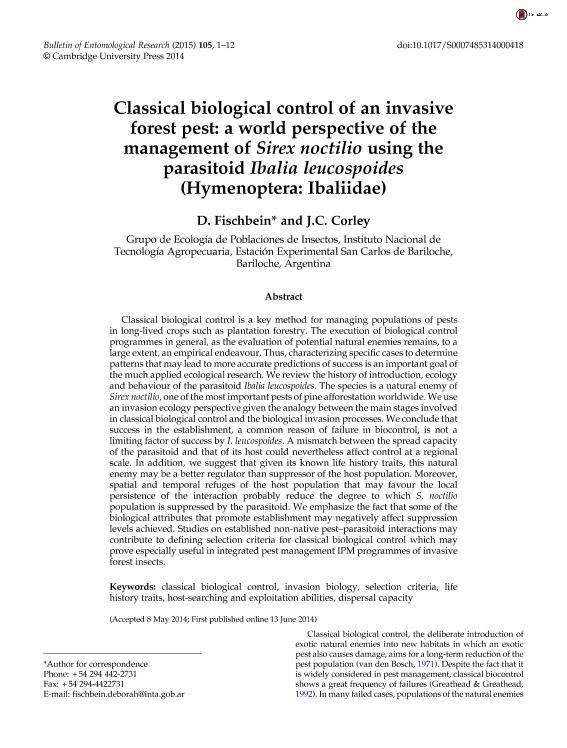Artículo
Classical biological control of an invasive forest pest: A world perspective of the management of Sirex noctilio using the parasitoid Ibalia leucospoides (Hymenoptera: Ibaliidae)
Fecha de publicación:
02/2015
Editorial:
Cambridge University Press
Revista:
Bulletin of Entomological Research
ISSN:
0007-4853
Idioma:
Inglés
Tipo de recurso:
Artículo publicado
Clasificación temática:
Resumen
Classical biological control is a key method for managing populations of pests in long-lived crops such as plantation forestry. The execution of biological control programmes in general, as the evaluation of potential natural enemies remains, to a large extent, an empirical endeavour. Thus, characterizing specific cases to determine patterns that may lead to more accurate predictions of success is an important goal of the much applied ecological research. We review the history of introduction, ecology and behaviour of the parasitoid Ibalia leucospoides. The species is a natural enemy of Sirex noctilio, one of the most important pests of pine afforestation worldwide. We use an invasion ecology perspective given the analogy between the main stages involved in classical biological control and the biological invasion processes. We conclude that success in the establishment, a common reason of failure in biocontrol, is not a limiting factor of success by I. leucospoides. A mismatch between the spread capacity of the parasitoid and that of its host could nevertheless affect control at a regional scale. In addition, we suggest that given its known life history traits, this natural enemy may be a better regulator than suppressor of the host population. Moreover, spatial and temporal refuges of the host population that may favour the local persistence of the interaction probably reduce the degree to which S. noctilio population is suppressed by the parasitoid. We emphasize the fact that some of the biological attributes that promote establishment may negatively affect suppression levels achieved. Studies on established non-native pest-parasitoid interactions may contribute to defining selection criteria for classical biological control which may prove especially useful in integrated pest management IPM programmes of invasive forest insects.
Archivos asociados
Licencia
Identificadores
Colecciones
Articulos(CCT - PATAGONIA NORTE)
Articulos de CTRO.CIENTIFICO TECNOL.CONICET - PATAGONIA NORTE
Articulos de CTRO.CIENTIFICO TECNOL.CONICET - PATAGONIA NORTE
Citación
Fischbein, Deborah; Corley, Juan Carlos; Classical biological control of an invasive forest pest: A world perspective of the management of Sirex noctilio using the parasitoid Ibalia leucospoides (Hymenoptera: Ibaliidae); Cambridge University Press; Bulletin of Entomological Research; 105; 1; 2-2015; 1-12
Compartir
Altmétricas




